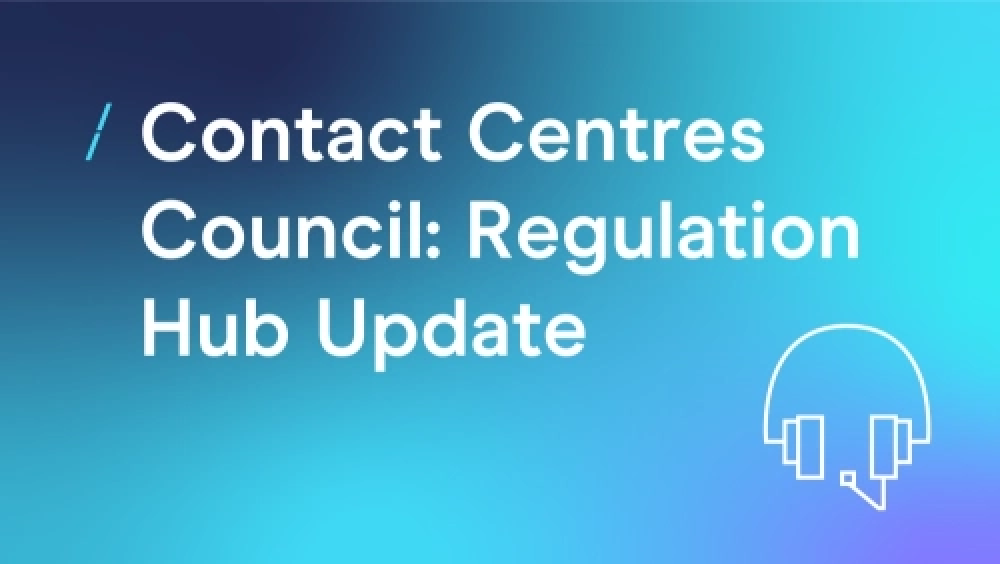Regulation Hub Update - October & November 2022
24 Nov 2022

This article is written by Steve Sullivan, the Deputy Chair of the Contact Centre Council.
The latest regulation and compliance news from the DMA Contact Centre Council’s Regulation Hub.
It’s been a little while since the last Update, so here’s a catch-up on some of the bigger stories of the past few months from the main regulators in the contact centre world.
ICO Fines

After what was a bumper year for enforcements and fines in 2021, the ICO has still levied a historically high number of fines in 2022 thus far. The vast majority of ICO enforcement are to do with organisations breaking the direct marketing rules – and half of the fines directly involve contact centres. You can read more about the case on the ICO’s website here.
As ever, many fines are of firms which don’t screen their calling lists against the Telephone Preference Service (TPS) opt-out list. But its also of note that the misuse of Calling Line Identification numbers (CLIs) and third-party data without the proper consents required feature in many cases.
Ticketmaster’s Leaky Bot
One specific case of note for contact centres is that of Ticketmaster, which over the summer abandoned its attempt to appeal a £1.25m fine imposed on it by the ICO after a 2018 data breach. The cause of the data breach was a chatbot installed on Ticketmaster’s payment page. The bot created a cyber vulnerability, which was exploited by hackers to steal the card details of thousands of customers. When the ICO investigated the case the chatbot provider, Inbenta, insisted that they had warned Ticketmaster not to use the bot on its payment / check-out pages. The ICO sided with Inbenta and decided that Ticketmaster was at fault. A cautionary tale!
Complaints About Complaints
Ofcom’s quarterly customer complaints analysis continues to show that overall complaint levels are static. The good news is that both EE and Sky tend to consistently perform well. By contrast, Virgin Media, BT Mobile and relative newcomer on the league tables, Shell Energy (after its purchase of the Post Office’s broadband business) perform badly. The greatest area of weakness for all 3 is their handling of complaints themselves, so that their initial failure leads to a ‘multiplier’ effect - which is very hard to surmount.
Your Call is Becoming Less Important To Us
In the summer Ofcom's 'Comparing Customer Service' paper showed that there continue to be very big variations in customer service standards between suppliers. Interestingly, a couple of low-cost challenger sub-brands of Sky and BT, respectively (Now and Plusnet) are doing surprisingly well. There is obviously a lot more to the customer experience than call wait times, but as the phone is still the typical channel of choice when consumers are facing critical problems it matters.
Parcel Firms Threatened with Massive New Fines
Ofcom's figures show that in 2020/21 parcel volumes (4.2bn) were starting to catch up with the total volume of letters sent (7bn) which continue their long-term decline. With so many parcels being delivered, perhaps it's no surprise that most consumers have experienced problems with couriers. And 25% of people have had difficulties when attempting to complain about a delivery service.
New rules which will be live from Spring 2023 will give Ofcom the power to fine parcel firms which don't handle and resolve complaints properly - theoretically up to 10% of the firms' turnover. Ofcom is particularly concerned about the quality of complaint handling for customers with disabilities and those who are vulnerable.
Overseas News
In Spain the government there has imposed a maximum 3 minute call waiting time for large firms (and no, bots handling calls don't count). The mayhem this would cause if imposed in the UK is unimaginable, so it will be fascinating to see how this pans out in practice.
Over in France the government has announced some restrictions on domestic telemarketers, including:
· Calling restricted to 10am to 1pm and 2pm to 8pm weekdays only
- Maximum 4 attempts per customer
And it's already law that all outbound calls are to be prefixed 09.
DRTV Changes
The PSA’s latest Code of Practice (#15) took effect in the spring. The Code included a number of changes (see here), but for DRTV the Code requires that prior to purchase "...consumers must be fully and clearly informed of all information that would reasonably be likely to influence their decision to purchase, including: the name and contact details of the provider responsible for customer care and complaints handling (either the intermediary provider or merchant provider)” which means that full contact details for the brand / charity (or its customer service provider) must be made available on advertising.
PSA Says Over & Out
In a refreshing example of a compliance body regulating itself out of a job - or perhaps just a case of the scammers moving on to pastures new - the PSA has decided to wind itself up and transfer its responsibilities back to Ofcom from 2023.
In the summer Citizens Advice published its latest analysis of energy firms' customer service performance. And it's not a cheery read for either suppliers or customers - nor is it likely to get much better anytime soon.
truEnergy, Utilita & Scottish Power’s ‘Severe Weaknesses’ in Treatment of Struggling Consumers
After a review Ofgem is now demanding that suppliers improve their treatment of customers experiencing payment difficulties
Ofgem has highlighting 3 suppliers in particular – truEnergy, Utilita and Scottish Power - which were found to have "severe" weaknesses in how they support customers. Specific areas of concern were
- No relevant policies
- Lack of quality management and oversight
- Poor or missing staff training
These weaknesses are an obvious operational concern for the suppliers at a time when customer payment difficulties will surely only increase still further. But – as the Ofcom complaints reporting discussed above shows – the risks of falling into a situation in which high volumes of complaints are generated and there is no easy way of escaping from a cycle of customer dissatisfaction are massive for these firms.
As an aside, Ofgem found that one firm had no significant issues. Well done British Gas!
Content accurate as of 1st November 2022
See more from the Contact Centre Council here.
If you're interested in joining the Contact Centre Council, please contact Councils@dma.org.uk




Please login to comment.
Comments